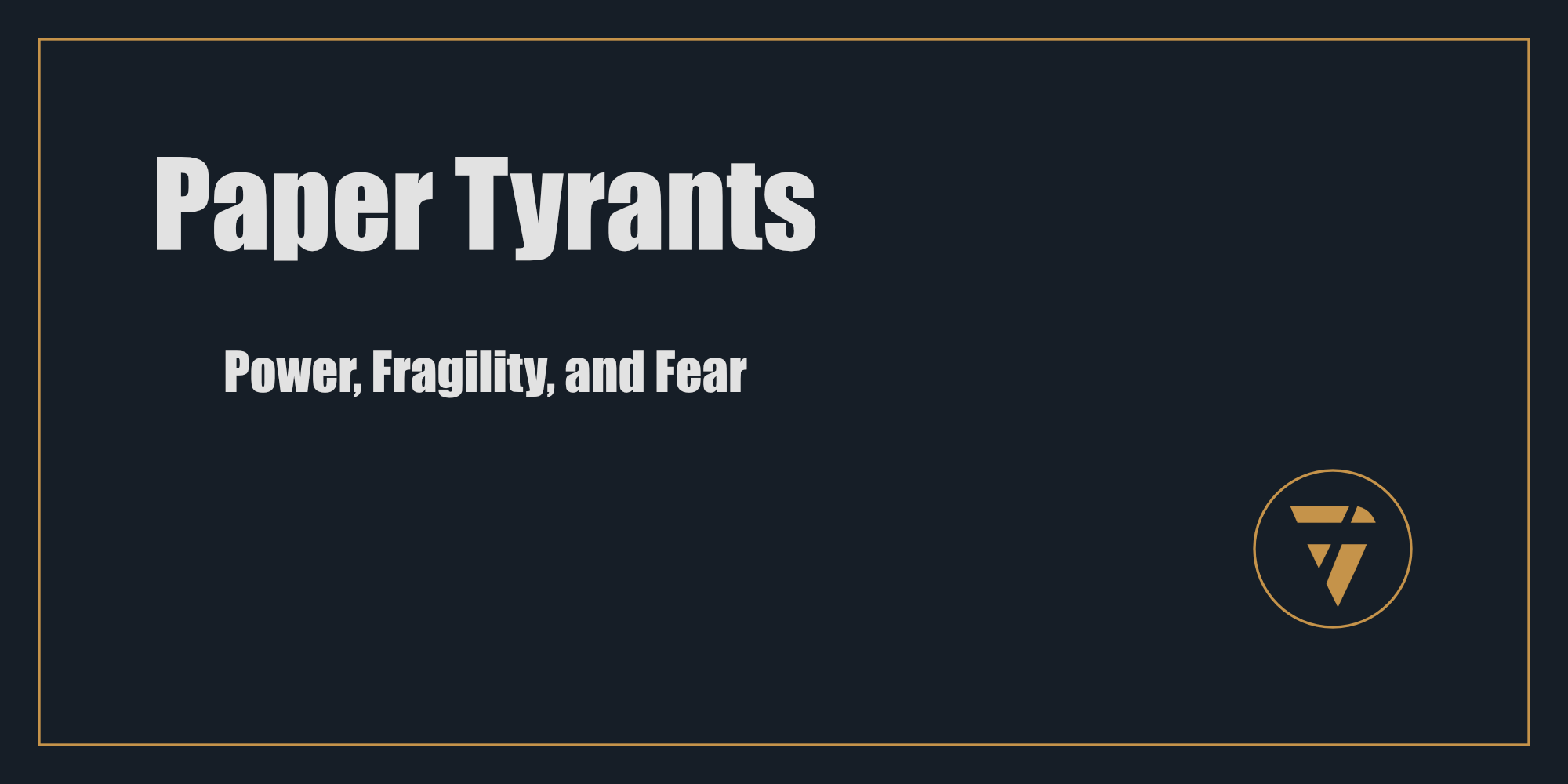Paper Tyrants

Power, Fragility, and Fear
The strongman is a paradox—wielding immense power yet consumed by fear, projecting dominance yet perpetually on the verge of collapse. Throughout history, rulers, corporate titans, and cult-like figures have risen through the illusion of invincibility, only to reveal their greatest weakness: their own need for control.
The strongman does not build lasting systems; he builds a fragile cult of personality that crumbles the moment reality asserts itself. His strength is performative, his authority dependent on fear, and his downfall inevitable. This is the study of the Paper Tyrant—a ruler whose power is vast yet brittle, propped up by illusion and insecurity.
I. The Fear of Losing Control
For a true leader, power is a means to achieve goals. For the strongman, power is the goal itself. This difference defines his every action—where a visionary builds structures that endure beyond him, the strongman constructs a world that cannot function in his absence.
The Cult of the Individual
A Paper Tyrant must always be at the centre of the story. He takes credit for every victory, blames others for every failure, and purges those who show independent thought. He does not surround himself with competence, but with compliance—replacing advisors with flatterers and visionaries with loyalists.
The Threat of Delegation
To delegate power is to admit that others might be capable. The strongman cannot allow this. He systematically eliminates anyone who might rival his influence, resulting in a hollowed-out inner circle of fearful yes-men. But paranoia breeds paralysis. As crises mount, the strongman—having refused to empower anyone but himself—finds that he alone is responsible.
The more he tightens his grip, the weaker he becomes.
II. The Obsession with Perception Over Reality
A Paper Tyrant must always be seen as strong, even at the cost of actual strength. This obsession leads to governance through spectacle rather than substance—where media control, propaganda, and elaborate displays of power become more important than functional leadership.
Propaganda as a Crutch
Every regime needs a narrative, but the strongman’s narrative is reality itself. His enemies are always growing in number; his victories are always historic. If the economy collapses, it is sabotage. If his policies fail, it is betrayal. If a war drags on, it is proof of his endurance.
Over time, he becomes a prisoner of his own fictions. He must continue the illusion of invulnerability, even as his nation, company, or movement fractures beneath him.
The Blindness of Absolute Authority
The strongman’s refusal to hear bad news ensures that no one delivers it. Ministers, executives, or generals tailor their reports to match his fantasies. Bad decisions are reinforced rather than corrected. Critical failures are hidden until they explode into crises. The result? The strongman, despite commanding vast resources, is often the last to know when his empire is falling apart.
He mistakes silence for loyalty and obedience for stability—until both disappear.
III. The Need for Enemies
A Paper Tyrant cannot rule in peace. Without a constant state of conflict, his presence becomes unnecessary. He does not govern; he defends—from foreign adversaries, domestic conspirators, or ideological subversives.
The External Threat
Enemies must always exist. If none are readily available, they will be manufactured. Wars are not fought to be won, but to sustain the illusion of necessity. Opponents must never be legitimate rivals; they must be existential threats, enemies of the people, demons disguised as men.
The Internal Purge
As the years pass, the strongman’s enemies list expands. First, it includes actual opposition. Then, it includes former allies. Eventually, it includes those who served him loyally but became too powerful to be trusted.
The strategy backfires. The purges create fear, and fear creates inaction. No one dares to take initiative. No one dares to tell the truth. The strongman’s empire rots from within.
IV. The Fragility of Fear
Fear is powerful—but it's not sustainable. A leader who rules through respect can endure. A leader who rules through fear must remain feared, or he will fall.
The Collapse is Sudden
A Paper Tyrant does not fade gracefully. His rule depends on absolute control, and absolute control allows no safe exit. When his grip falters, there is no loyalty left to catch him. The moment people sense weakness, they abandon him. Those who once cheered him now deny ever believing in him. His name becomes an embarrassment, his statues are torn down, and his legacy is buried under ridicule.
Because he built nothing but himself, there is nothing left when he is gone.
The Hollow Legacy
Where are the strongmen of past generations? They are remembered as cautionary tales. Their monuments are ruins, their works undone, their stories rewritten by those who came after them. The legacies of true leaders—those who built institutions, empowered others, and embraced adaptability—endure.
The strongman, however, leaves behind nothing but wreckage.
Strength is Not Domination
The greatest irony of the strongman is that he is, in the end, the weakest of all leaders.
- He isolates himself, mistaking obedience for loyalty.
- He blinds himself, mistaking spectacle for stability.
- He exhausts his people, mistaking control for competence.
- He fears his own empire, mistaking paranoia for vigilance.
The Paper Tyrant falls not because he is overpowered, but because his foundation was always weak. The strength he projected was an illusion. The empire he built was made of glass. And when the final crack appears, the collapse is instant.
The world will always have strongmen. But it will also always see them fall. And when they do, it will become clear: they were never as powerful as they seemed.
This is what I’m working on. Tell me what you think, I enjoy the conversation! Subscribe and follow the work in real time.
Thanks!
B

Paper tyrants rule through fear, not strength. The more control they demand, the weaker they become. Their grip tightens, their circle shrinks, and when the fall comes... it’s instant. The strongman is always the weakest of all.
PS -






